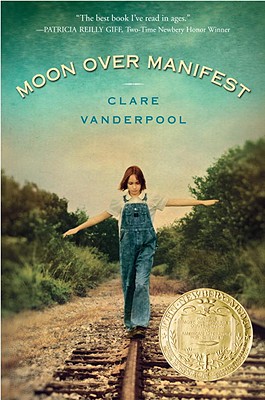
Summary
Its the Great Depression and Abilene Tucker has spent the better part of her life drifting and riding the rails with her vagabond father Gideon. After Abilene survives a serious injury, Gideon decides that a life on the road is no life for a young woman. Abilene is sent to live in Manifest, the only town Gideon has ever called home. As Abilene settles into her new digs, a bar turned makeshift Baptist Church, she uncovers a box of letters and trinkets. With the help of these mementos and a Hungarian diviner Abilene visits 1918 Manifest and discovers a world of knowledge about the town as it was--and why her father called it home.
Side by Side With Other Award Winners
There are two books I can think of that parallel elements of Moon Over Manifest (Newbery Medal), each is well regarded in their own right: Holes by Louis Sachar (Newbery Medal) and Bud, Not Buddy (Newbery Medal & Coretta Scott King Award) by Christopher Paul Curtis. Like Sachar, Vanderpool unites two stories--one present, one past--and makes them whole. In Bud, Not Buddy our title character sets out to find his father with the help of mementos from his mother’s past--Abilene discovers her father in a similar way. Bud, Not Buddy and Moon Over Manifest, both set during the Great Depression, shed light on racial and ethnic inequalities. Moon Over Manifest would be well paired with Holes or Bud, Not Buddy on library and class reading lists.
Final Thoughts
Moon Over Manifest is quite honestly one of the best books I’ve read. Why? First, the book is technically sound. Vanderpool weaves together two fully developed storylines like a true professional. Her vivid language makes the setting become real. The main characters are extremely well developed, helping the reader latch on to the story. Beyond that, the supporting cast (a whole town full) adds vital color and content to the book.
I must say, I think the setting of Moon Over Manifest is what really makes me love this book. If a young reader you know enjoys historical fiction, this book is an obvious next read. Vanderpool serves up the Great Depression, World War I, and prohibition. Along with that she addresses immigration, race and class struggles of the time. Moon Over Manifest is an amazing opportunity for young readers to learn about these eras and issues through “experience.”While none of these topics are to be taken lightly, this book is a fun and enjoyable read. There's a great balance between the weight of the subjects at hand, and the whimsy of the story and its characters.

